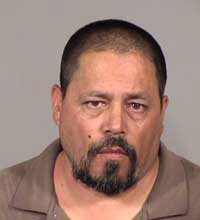 |
 |
 |
 News from Around the Americas | August 2007 News from Around the Americas | August 2007  
Run by California Fugitive Backfires
 Rod Leveque - Daily Bulletin Rod Leveque - Daily Bulletin
go to original


| | Roberto Rios Huerta, wanted for the Sept. 30, 2000, murder of his brother-in law, Ricardo Campos, in Ontario, was arrested last year in Mexico. Huerta was convicted and sentenced to 30 years in prison. (Courtesy Photo) |
Ontario, CA - A fugitive murder suspect wanted by police for the past seven years has been found, and it turns out his decision to run from the law may not have been a good one.

Roberto Rios Huerta was arrested last year in Mexico on a warrant stemming from the murder of his brother-in-law in Ontario.

Rather than send him back to California for prosecution, the Mexican government quietly convicted him of the killing in a trial where no witnesses were called. He was sentenced to 30 years in Mexican prison late last month.

American authorities didn't know Huerta had even been captured until Thursday, when Mexican officials formerly notified them of the conviction and sentence.

Ontario police Detective Byron Lee, who has hunted Huerta since the killing, was thrilled by the news.

"Justice has definitely been done," said Lee, who called off his search for Huerta on Thursday morning. "It shows that fugitives who run from the U.S. are really, under these conditions, picking a less pleasant alternative. He's going to do 30 years of very hard time in a Mexican prison."

Police say Huerta shot his brother-in-law, 45-year-old Ricardo Campos, at a family gathering in the 300 block of West Park Street in Ontario on Sept. 30, 2000.

Huerta's relatives said he had been drinking and was acting belligerently. When Campos asked him to leave, Huerta went to his car and got a .38-caliber handgun.

Campos pushed several children out of the way as Huerta approached him with the gun and shot three times, authorities said.

Huerta, a Mexican citizen, then fled, and detectives suspected he had crossed the border.

Ontario police and the state attorney general submitted their case against Huerta to the Mexican government in January 2001 seeking an arrest warrant pursuant to Article 4 of the Mexican federal penal code.

That provision of Mexican law states that crimes committed in a foreign country by a Mexican citizen will be prosecuted and punished in Mexico so long as a few basic conditions are met.

Huerta's case fit the bill, and the Mexican government issued a warrant for his arrest.

Huerta's whereabouts, however, remained murky for the next several years.

He was spotted at his sister's house in San Gabriel in February 2004, but slipped away before officers got there.

Then, in April 2006, he was arrested for a vehicle code violation in Fresno. He didn't have an ID, gave officers a fake name and was released.

That arrest was discovered just last week, when Lee ran Huerta's fingerprints through a computer database looking for clues to his location.

The hit gave Lee new hope of finding Huerta, and he had already began ratcheting up his search when he got an unexpected call from the California Attorney General's Office on Thursday morning notifying him of Huerta's capture.

"It was shock and disbelief for me," Lee said. "He's been one of these guys, ... for the last seven years, who is just a phantom. At times he seemed like he fell off the earth."

As it turned out, Huerta, 49, fled back to Mexico shortly after his close call with Fresno police.

Mexican authorities arrested him Aug. 15, 2006. He was tried for the murder before the 2nd District Court in Guadalajara, convicted on June 29 and sentenced to prison July 29.

It was unclear Thursday how Mexican police caught him.

Albert Martinez, special agent supervisor for the California Department of Justice Foreign Prosecution Unit, said Thursday that no witnesses were called to testify in Huerta's trial.

Rather, the judge simply reviewed the reports, statements and photos provided by Ontario police in support of the Article 4 arrest warrant.

In the United States, persons charged with a crime have a constitutional right to confront and cross-examine witnesses against them.

In Mexico, no such law exists, Martinez said.

"Their judicial system is very different," Martinez said.

Also unlike in the United States, Huerta will have to serve every day of his 30-year sentence.

"Mexican prisons are not quite the same, either," Martinez said.

Martinez said Huerta still has the right to appeal his sentence in Mexico and that he expected the now-convicted killer will do so.

Lee broke the news of Huerta's arrest to Campos' family Thursday afternoon.

Campos' daughter, Araceli, said she cried upon hearing it, but "it was more like a happy cry."

At times, she said, she lost faith that a day like this would come.

"It wasn't fair that he be out there, the way he took my dad's life," she said. "I think it will be worse for him in prison in Mexico. But it's better that way. He deserves the worst."

Rod Leveque can be reached by email at r_leveque@dailybulletin.com. | 
 | |
 |



